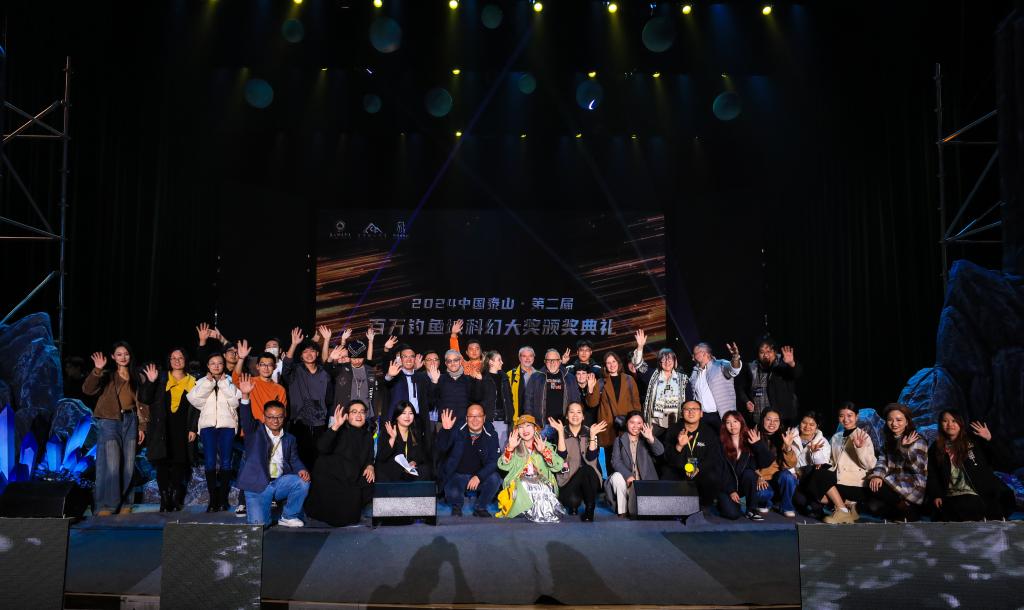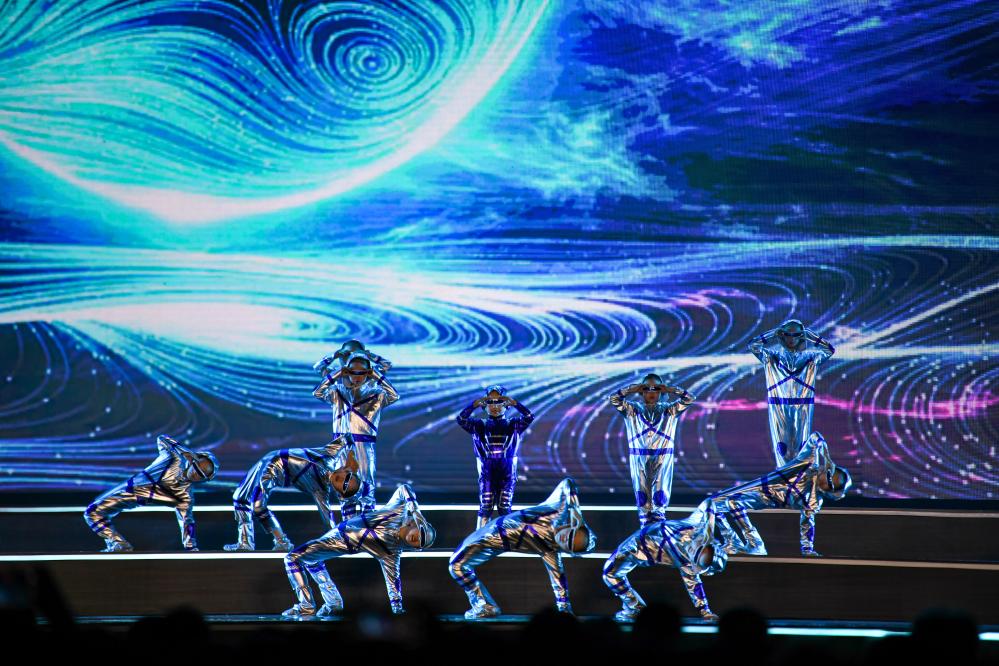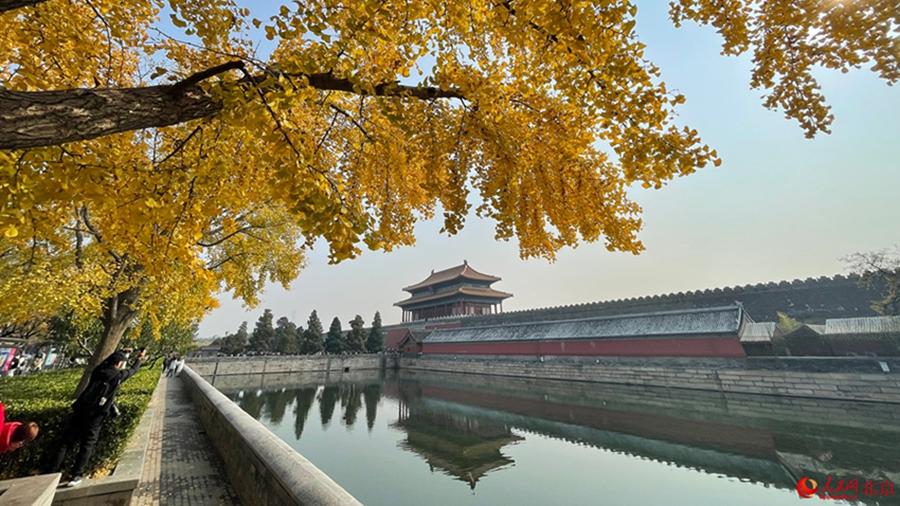Chinese science fiction ascends new heights

Winners and participants of the second Fishing Fortress Science Fiction Awards pose for a group photo on stage in Tai'an, east China's Shandong Province, Nov. 10, 2024. (Xinhua/Han Song)
JINAN, Nov. 10 (Xinhua) -- One day, Confucius ascended Mount Tai, only to find that the world had already perished countless times. Yet, in the end, after all the hardships, he did encounter a future China. This is a narrative contained in the renowned short story "It Dwarfs All Peaks Under My Feet," crafted by Jia Liyuan, an associate professor at Tsinghua University, who writes under the pseudonym Feidao.
In this story, Jia seeks to express that within the cyclical nature of history, even in times of war and chaos like the Spring and Autumn and Warring States periods (770-221 BC), people are also in pursuit of "Tao," or "truth."
Mount Tai, located in Confucius' home province of Shandong in the east of China, is a listed UNESCO World Cultural and Natural Heritage Site and a symbolic emblem of Chinese civilization. Over the past 2,000 years, emperors have regarded the act of offering sacrifices at Mount Tai as the highest honor of their lifetimes. This place is also where Confucianism, Buddhism and Taoism intersect and blend.
From Nov. 8 to 10, Taishan College of Science and Technology held a science fiction carnival at the foot of this mountain, attracting hundreds of science fiction writers from home and abroad.
The Fishing Fortress Science Fiction Awards (FFSFA) were given to outstanding writers, translators, publishers, teachers, artists, media professionals and others, in recognition of their contributions to promoting the influence of science fiction.
The best novel award went to Tianrui Shuofu's "We Live in Nanjing," which tells the story of a group of ordinary Chinese who use modern technology to save the future Earth.
Award winners made their way to Dai Temple at Mount Tai, a sacred site where ancients once paid homage to the divine. From there, they ascended to the mountain's peak, engaging in a dialogue on the fusion of traditional Chinese culture with cutting-edge science and technology. They explored strategies to address the pressing issues confronting modern humanity, such as environmental degradation, runaway technology and the scourges of hunger and war.

Actors perform during the award ceremony for the 2023 Hugo Awards during the 81st World Science Fiction Convention (WorldCon) in Chengdu, southwest China's Sichuan Province, Oct. 21, 2023. (Xinhua/Wang Xi)
Following China's hosting of the World Science Fiction Convention last October, the Mount Tai event took the country's sci-fi craze to a new height.
Over 100 sci-fi writing contests were held nationwide last year, offering prizes totaling more than 44 million yuan (about 6.2 million U.S. dollars), which were supported by either the government or enterprises. The annual output value of China's sci-fi industry, which includes publishing, games and movies, exceeded 110 billion yuan in 2023.
Jia said that the surge in popularity of science fiction in China is truly remarkable. This year commemorates the 120th anniversary of the inception of Chinese science fiction. When esteemed author Lu Xun and his contemporaries introduced the genre to China at the turn of the previous century, they aspired for it to broaden the intellectual horizons of the populace and to ignite new aspirations.
Like many fields, this genre had traditionally been monopolized by the West, however, it is now becoming a vibrant "soft power" and being exported from China to the rest of the world.
"The Three-Body Problem" has sold tens of millions of copies worldwide and has been adapted into a Netflix television series -- with its fans including Barack Obama and Mark Zuckerberg.
Yang Ping, a key organizer of the event at Mount Tai, stated that the burgeoning popularity of science fiction in China is a reflection of the nation's economic and technological advancements. Yang himself is a sci-fi writer known for covering subjects such as cyberpunk and Mars exploration.
China is constantly promoting the development of artificial intelligence, implementing lunar and Martian exploration programs, and has vowed to realize the strategic goal of building a strong country in science and technology by 2035. These efforts have stimulated the imagination of writers, Yang said.
Liu Cixin's novels have erected a towering peak, and Chinese science fiction writers must continue to climb higher, he added.
Unlike government-sponsored events such as the China Science Fiction Convention, the FFSFA was set up by a private enterprise, China New Business School Group, which is committed to investing in education. At present, the group operates three private universities featuring a total of more than 100,000 students. Taishan College of Science and Technology is one of these universities.
"I aspire to cultivate the holistic youth of the new era, who will not only acquire knowledge and skills but also evolve into well-rounded individuals capable of envisioning, uncovering and crafting the novelties of our world," said Peng Hongbin, chairman of the group. This vision encapsulates his philosophy of "perfect education," and within this framework, science fiction holds a distinctive position in stimulating the aforementioned capabilities.
Peng has established a "Science Fiction Academy" to encourage students to read and write sci-fi stories and even make sci-fi films. When he founded and staged the first FFSFA in 2023, he decided to move the sci-fi awards venue to Mount Tai the following year, and use the ladder of science and imagination to "ascend to the sky."
Zhang Fan, founder of the Science Fiction Academy, said sci-fi is an art about tomorrow. Through this genre, writers and artists are not only able to express their free imagination concerning unknown worlds, but can also bravely face various possible future scenarios and uncertainties.
Professor Wu Yan from the Southern University of Science and Technology, a winner at the FFSFA, said that science fiction offers young people a glimpse into the future. "In this era, those who can envision the future hold the advantage. As China ascends on the global stage, the Chinese people possess both the right and the capability to shape the future narrative," Wu noted.
Photos
Related Stories
Copyright © 2024 People's Daily Online. All Rights Reserved.









